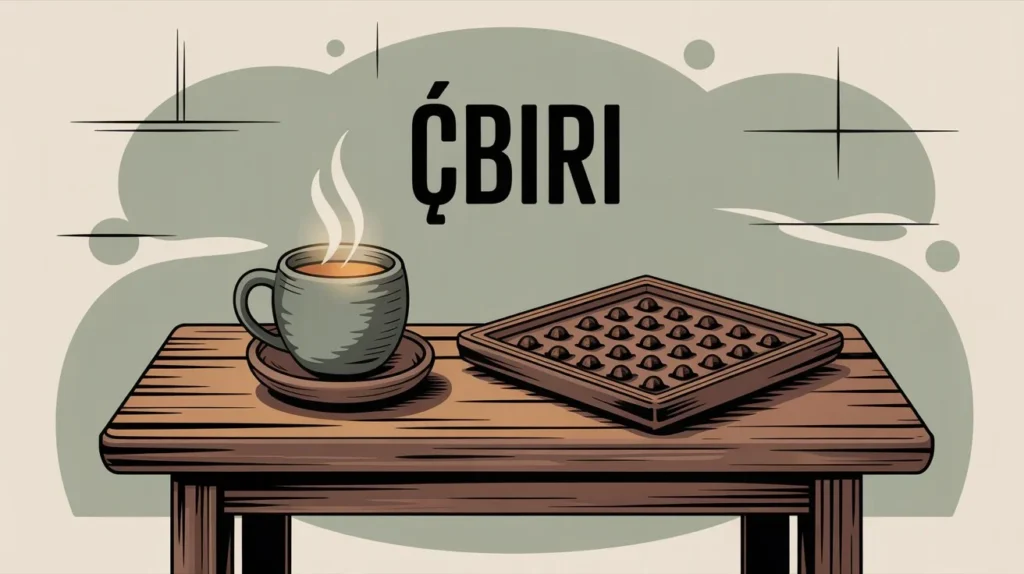Introduction to Çbiri
Çbiri is one of those rare traditions that refuses to be placed in a single box. For some communities, it has been cherished as a traditional drink, made with care and passed down through family recipes. For others, Çbiri has lived on as a strategy game, a form of folk entertainment that taught patience, planning, and wisdom. Over time, Çbiri also became a symbol of cultural adaptability, showing how traditions can evolve without losing their spirit.
In today’s world, where people crave authenticity and meaning, Çbiri is gaining attention once again. Its story is not just about the past but about how an old tradition can offer guidance, health, and entertainment in the modern era. This article explores Çbiri from every angle, its origins, cultural significance, health benefits, gameplay, and potential revival in the digital age.
History and Origins of Çbiri
The origins of Çbiri can be traced back centuries to rural villages where culture was preserved not in books or formal education, but through oral traditions, rituals, and community life. It was never just a drink or just a game; it was an everyday practice woven into meals, gatherings, and play.
- As a drink, Çbiri represented nourishment and hospitality. Families prepared it with locally sourced ingredients, each recipe slightly different but equally valued.
- As a game, it represented education through entertainment. Children and adults learned strategy, teamwork, and foresight while enjoying playful competition.
- As a cultural practice, Çbiri stood for unity. Whether shared in a cup or across a game board, it reminded people of the importance of health, balance, and resilience.
What makes Çbiri unique is its dual nature. Most traditions focus on one domain, but Çbiri combined the physical (drink) with the intellectual (game). This balance is why it survived across generations and why it still matters today.
Çbiri as a Drink and its Cultural Value
Çbiri as a Traditional Drink
Among the many forms of Çbiri, its identity as a traditional beverage is the most enduring. For centuries, households prepared Çbiri using natural, locally available ingredients. Each family had its own recipes, which were passed down through generations, making the drink not just a refreshment but a living memory of heritage.
Preparation was often a communal activity. Elders guided the younger members, teaching them the right mixtures and timing. The process itself carried meaning, reinforcing the idea that culture is preserved through shared participation. When Çbiri was served, it was never just about quenching thirst—it was about showing care, respect, and belonging.
How Çbiri Was Consumed
Çbiri was a social drink. Families enjoyed it during daily meals, gatherings, and festivals. When guests arrived, offering Çbiri was a sign of hospitality, proving that the host valued their presence. During harvests and cultural celebrations, Çbiri was often central, binding people together in shared rituals.
This ritual of drinking Çbiri transformed it from a simple beverage into a symbol of unity and community life. In villages, it was not uncommon for neighbors to share their batches of Çbiri, turning the act of consumption into an exchange of trust and goodwill.
Health Benefits of Çbiri
Beyond taste and culture, Çbiri was valued for its natural health benefits. The ingredients, depending on the region, were chosen for their healing and strengthening properties. Oral histories describe Çbiri as:
- A digestive booster, helping balance meals heavy in grains or meats
- An energy source, especially useful for farmers and laborers working long hours
- A wellness remedy, believed to maintain harmony between body and mind
In today’s age of wellness drinks and superfoods, Çbiri could easily find its place on the global stage. Its authentic roots and natural composition make it more appealing than many artificial health products.
Cultural Value of the Drink
For the communities that practiced it, Çbiri was not simply food—it was culture in a cup. Serving it meant more than offering refreshment; it meant extending respect, warmth, and kinship. In many traditions, drinking Çbiri was part of rituals that marked important life events, seasonal changes, and community gatherings.
The cultural weight of Çbiri reminds us that meals and drinks are never just physical necessities. They are experiences that connect people, pass down values, and symbolize belonging. This is why Çbiri, even as a simple drink, carries far deeper meaning than its ingredients alone.
Çbiri as a Game and Cultural Lessons
Çbiri as a Forgotten Strategy Game
While Çbiri is often remembered as a drink, it also held a strong identity as a folk strategy game. The game was simple in appearance but rich in meaning. Players used seeds, stones, or small tokens, placing and moving them across carved pits or wooden boards. The goal was to capture, protect, or outsmart an opponent through careful planning.
Unlike modern video games that rely on speed and graphics, Çbiri focused on mindful play. It encouraged players to think ahead, to weigh choices, and to develop patience. This made it more than entertainment—it was a training ground for strategy and resilience.
Gameplay and Possibilities
The rules of Çbiri varied from village to village, but the central theme was always the same: resource distribution and planning. Players learned how to protect their position while slowly building toward victory.
Children often played to learn counting, coordination, and memory, while adults enjoyed testing their strategic abilities against one another. This made Çbiri both educational and recreational, bridging generations and keeping communities engaged.
Traditional vs Modern Çbiri
Over the centuries, Çbiri has faced the same challenge as many folk traditions: modernization.
- Traditional Game: Played face-to-face, using natural items like stones or seeds, and guided by oral rules passed down from elders. It taught patience, discipline, and community values.
- Modern Times: The game is nearly forgotten, overshadowed by video games and digital entertainment. Few people know its rules, and fewer still play it in its original form.
This shift raises the important question: how can Çbiri be preserved or adapted without losing the lessons it was meant to teach?
Cultural Teachings from the Game
The beauty of Çbiri as a game lies in the values hidden beneath its rules. It was not just about winning. It was about learning life skills.
- Patience: Every move required thought and calm decision-making.
- Foresight: Players had to look ahead and prepare for outcomes.
- Unity: Playing together strengthened social bonds.
- Resilience: Losing was part of the process, teaching endurance and humility.
In this way, Çbiri became more than just a pastime. It was a philosophy of life, expressed through simple seeds and stones.
Why These Lessons Still Matter
Even in 2025, the principles behind Çbiri’s game format remain relevant. Modern society values quick results, but Çbiri teaches the importance of slow thinking, collaboration, and long-term strategy. Reviving this forgotten game can offer not only entertainment but also timeless wisdom for future generations.

Digital Revival, Challenges, and Future of Çbiri
The Linguistic Connection
A curious aspect of Çbiri is its similarity to the Turkish word çeviri, which means translation. While unrelated in origin, this overlap is symbolic. Just as translation connects languages and people, Çbiri connects body and mind, tradition and modernity. This linguistic link highlights that culture, like language, evolves and adapts with time.
Digital Revival of Çbiri
In today’s era, forgotten traditions are finding new life through technology. Çbiri, too, can be revived digitally.
- As a drink: Brands can introduce Çbiri in wellness markets, positioning it alongside kombucha, green tea, or herbal infusions. Storytelling about its heritage would make it stand out.
- As a game: Developers can create mobile apps or online platforms where Çbiri’s strategy gameplay is modernized yet faithful to its roots.
- As culture: Museums, archives, and online communities can document Çbiri’s history, preserving it for future generations.
Case Study: Mancala
Mancala, another ancient game, was once a simple pastime with stones. Today, it exists as apps, online multiplayer challenges, and educational tools worldwide. Çbiri could follow the same path, showing that a tradition can remain authentic while adapting to modern audiences.
Benefits of Digital Revival
- Preservation: Protects Çbiri from being forgotten
- Education: Teaches youth history through interactive formats
- Entertainment: Provides a mindful alternative to modern fast-paced games
- Global Reach: Expands Çbiri beyond its regional roots
Global Perspective of Çbiri
Çbiri may have started in local communities, but its message is universal. Just as tea ceremonies in Asia or chess in Europe became global cultural exports, Çbiri can serve as a bridge between cultures.
- For wellness lovers, Çbiri is an authentic, healthy drink.
- For gamers, it is a strategic, thoughtful pastime.
- For educators, it is a cultural tool to teach values of patience, foresight, and unity.
By presenting Çbiri to the world, we are not just sharing a tradition, we are sharing a way of thinking and living that resonates far beyond its origins.
Challenges in Preserving Çbiri
Preserving Çbiri is not without obstacles.
- Commercialization risks removing its authenticity.
- Loss of oral traditions means younger generations may never learn the real recipes or rules.
- Cultural overlap and confusion could dilute its true meaning.
- Digital competition makes it harder for Çbiri to stand out in today’s saturated market.
To overcome these, preservation must be balanced with innovation. Adaptation should never erase authenticity, it should amplify and celebrate it.
Why Çbiri Matters in 2025 and Beyond
In a world that is constantly rushing, Çbiri stands as a symbol of adaptability and resilience. Its survival across centuries shows that traditions can evolve without disappearing.
- As a drink: It promotes natural health and mindful consumption.
- As a game: It teaches foresight, patience, and strategy.
- As a tradition: It strengthens community bonds and identity.
Çbiri matters because it reminds us that wisdom is often hidden in simple practices. Its revival today can inspire both individual wellness and collective unity.
Conclusion
Çbiri is not just a drink, not just a game, it is a cultural treasure that holds lessons for the present and future. Its history proves that traditions can nourish both the body and the mind. Its modern revival shows how heritage can thrive even in a digital world.
Preserving Çbiri means preserving wisdom, resilience, and unity. Whether enjoyed in a cup, played as a game, or studied as culture, Çbiri continues to show us how traditions can adapt, survive, and inspire.
FAQs
Q1: What is Çbiri?
Çbiri is a traditional practice known both as a drink and as a strategy game.
Q2: Where did Çbiri originate?
It originated in rural communities, passed down through oral traditions and rituals.
Q3: Is Çbiri healthy?
Yes. As a drink, it has long been linked to digestive and energy benefits.
Q4: How was the game of Çbiri played?
It was a strategy game involving seeds or stones, similar to Mancala, focusing on patience and foresight.
Q5: Can Çbiri be revived today?
Yes, through digital apps, cultural storytelling, and wellness branding.
Q6: Does Çbiri matter outside its culture?
Absolutely. Its universal lessons of unity, resilience, and adaptability make it meaningful across the world.
Also Read: Pertadad: A Deep Dive into Meaning, Importance & Use

















